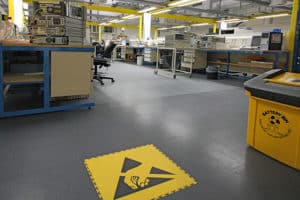What Is The Difference Between ESD and Anti Static Flooring?
If you are looking for a flooring solution for your workplace that controls static charge, you may be wondering what the difference is between ESD and anti static flooring and which one to purchase. Ultimately, each type of flooring prevents a person from building up a charge as they walk across the floor so they do not get a shock when they touch something that conducts electricity. However, the top layer of an anti-static floor has a coating that dissipates static across its surface so you never build up enough charge to get a shock, whereas ESD is a much more robust solution because it is actually earthed. ESD flooring gives a much higher level of protection than anti-static matting. This is because it is actually grounded.
The term anti-static refers to a very specific electrical resistance range of between 10⁹ and 10 to the 11 and only means that the floor itself will not generate static. It does not mean that the floor will eliminate static build up or dissipate static that may have already been built up in the body. This can only be achieved with a conductive (resistance range of between 10⁴ x 10⁶) or a dissipative (10⁷ to 10⁹) floor covering.
In general, you will need an ESD floor if you are manufacturing, repairing, servicing, handling or using equipment that is susceptible to damage from electro-static discharge, typical sectors would include the manufacture of components for the electronics industry, aviation, automotive, IT, medical, oil and gas, telecoms and IT for example. For electronics manufacturing applications that require the use of ESD footwear it’s fine to use charge-generating flooring materials like conductive vinyl.


